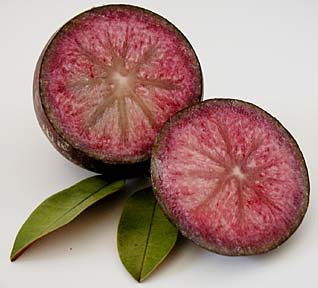

Key Ingredient

|
You may have seen this dark purple fruit with a slightly green tinge and wondered, what is it? It's not a plum, although it shares similar characteristics. It's a star apple, although it is not an apple at all.The basics: Star apple, also known as caimito, is native to the West Indies and central America. The fruit is a close relative of the chico or sapodilla. It is popular in the Caribbean and parts of Asia and the Philippines, where it is most often enjoyed out of hand or in a tropical fruit salad.
Star apple is round, with an average size slightly larger than a golf ball. Its skin, which is inedible, resembles that of a plum -- smooth and slightly rubbery.
Star apple comes in two varieties, one with dark purple skin and reddish purple flesh and one with greenish skin and clear white pulp. The fruit's inner core houses dark brown seeds. When cut in half the core takes on a star shape, thus the name. The flesh is sweet and soft, with a slightly slimy texture.
The star apple tree, also known as the golden leaf tree, is much treasured for its ornamental quality because the leaves have a gold tinge on the underside.
Selecting: Choose smooth and shiny fruit that gives slightly when squeezed. Star apple cannot be eaten until fully ripe and slightly soft. An unpleasant, sticky white sap is present in the skin of under-ripe fruit.
Storing: If star apple is hard, leave outside the refrigerator for a couple of days until slightly soft. After it ripens, store the fruit in the refrigerator for up to a week.
Use: Many prefer the fruit chilled. Wash, cut in half crosswise and spoon out the flesh. The fruit can then simply be eaten or mixed with other tropical fruits such as mango or pineapple for a unique fruit salad. In Jamaica, star apple is often combined with orange juice, sugar, nutmeg and sherry and eaten as a dessert.
Where to buy: Although star apple is available now, it may appear only on a sporadic basis in stores. Your best bet is Chinatown stands. Prices range from $1.99 to $2.99 a pound.
Food Stuffs: Morsels
Eleanor Nakama-Mitsunaga is
a free-lance food writer. Contact her
online through features@starbulletin.com